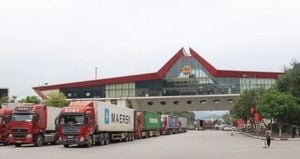On April 13, 2025, United Kingdom Prime Minister Keir Starmer announced a significant economic measure by suspending tariffs on 89 products, a decision aimed at alleviating the financial strain on British companies impacted by ongoing trade tensions with the United States. This suspension, which includes a diverse range of items such as electric vehicle batteries and agave syrup, will remain in effect until July 2027, according to a government statement.
This strategic move is part of a broader initiative to protect British firms from the tariffs imposed by former U.S. President Donald Trump. The government has recognized the pressing need to support local businesses as they navigate the complexities of international trade in a climate increasingly defined by tariffs and trade wars.
Starmer's government is not only suspending tariffs but is also increasing state-backed loans for companies, as reported by the Telegraph. This dual approach aims to bolster financial support for businesses that may struggle to compete under the weight of high tariffs and fluctuating market conditions.
Meanwhile, across the globe, the trade landscape remains tumultuous, particularly in China. E-commerce giants such as JD.com and Freshippo are stepping in to assist Chinese exporters who are feeling the pinch from U.S. tariffs. These companies have launched initiatives designed to help trade firms pivot from international markets to domestic consumers. This shift is crucial as the escalating tariff war has rendered traditional export routes increasingly untenable.
As of this year, Washington has imposed a staggering 145 percent tariff on Chinese imports, effectively raising the total tariff rate to about 156 percent. In retaliation, Beijing has responded with a new levy on U.S. goods, increasing it to 125 percent, compounding the challenges faced by exporters on both sides.
Industry groups and platforms in China are actively working to streamline access for trade firms to domestic markets. This collective effort aims to open new sales channels, allowing exporters to adapt to the rapidly changing economic environment. The collaboration between e-commerce platforms and national industry associations underscores a concerted effort to mitigate the impact of these tariffs.
The implications of these trade policies extend beyond the immediate economic concerns. They highlight the interconnected nature of global markets and the ripple effects that tariffs can create. As countries engage in tit-for-tat tariff increases, businesses are left scrambling to adjust their strategies, often at great cost.
In the U.K., the suspension of tariffs on essential products is seen as a lifeline for industries that have been adversely affected by the trade war. The government’s decision reflects a recognition that maintaining competitive pricing is vital for sustaining economic growth and protecting jobs within the country.
Starmer's administration is taking proactive steps to ensure that British firms can weather the storm of international trade disputes. By suspending tariffs and increasing financial support, the government is signaling its commitment to fostering a resilient economy capable of withstanding external pressures.
As the global trade environment continues to evolve, the actions taken by both the U.K. and China illustrate the challenges and opportunities that arise from navigating complex international relations. The focus on domestic markets by Chinese exporters and the protective measures adopted by the U.K. government reflect a broader trend of countries seeking to shield their economies from the fallout of trade wars.
Looking ahead, the effectiveness of these measures will be closely monitored. The U.K.'s suspension of tariffs and China's pivot to domestic sales are both crucial strategies aimed at mitigating the impact of tariffs. However, the long-term sustainability of these approaches remains uncertain as global economic conditions continue to fluctuate.
In conclusion, the recent tariff suspension by the U.K. and the initiatives launched by Chinese e-commerce giants signify a critical moment in international trade relations. As countries grapple with the consequences of tariffs, the focus on domestic markets and protective measures will likely shape the future of global commerce.





